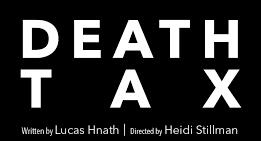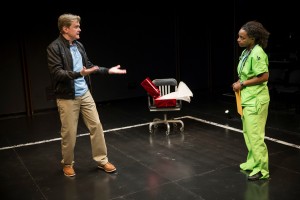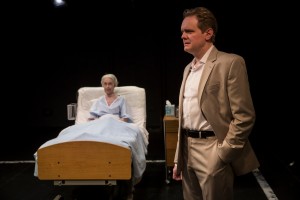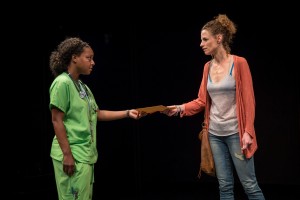REALITY THEFT
Twisting a devious course over a mere 80 minutes and across Lookingglass Theatre’s nearly barebones thrust stage, this puzzle play by Lucas Hnath (whose equally treacherous Isaac’s Eye just opened at Writers Theatre) throws us onto a roller coaster ride of shifting sympathies and strategic lies. One mistaken assumption’”a rich mother is certain that her daughter wants to kill her before the New Year triggers a “death tax” that will considerably reduce the estate’s bequest’”unleashes the law of unintended consequences with a vengeance.
What follows, gripping in Heidi Stillman’s tensile staging, is a lacerating look at self-fulfilling cynicism fueled by one woman’s very contagious fear of death. Death Tax is also an audience accuser, in effect asking after every seminal scene, “Well, what would you do?” Here the challenges of custody apply to much more than the ownership of children.
In five scenes that both build on and undermine their story, a swift and supple playwright seems to split the world into losers and users. As in Isaac’s Eye (a historical drama equally heavy with blackmail, corruption, and double crosses), Hnath clearly prefers characters who are grounded and genuine to deluded ones who must mold the world to their will. The cascade of crises begins simply enough: Bedridden and hospitalized, Maxine Johnson, a rich matron who believes that “people who are rich are worth preserving,” fears not just death but betrayal. Pathetically convinced that her worth is her wealth, Maxine confesses to Tina, a struggling nurse and Haitian immigrant, an ugly secret: She just knows that her undutiful (and unnamed) daughter is eager to “nudge” her into the grave; no question, her greedy child has bribed the nurse to make a merciless killing the forensically perfect crime.
Because Maxine projects her bitter belief that “no one does something for nothing” onto everyone around her, she sets in motion a chain of events that almost confirms her predatory perspective. More than this must not be disclosed, other than to mention the fourth character, Tina’s supervisor Todd: His unrequited passion for his employee makes him the perfect dupe, one more casualty in this plot of fools.
Few plays so trenchantly prove the power of a strategic lie to defeat a ton of truth, both in the present and far into the future. As if to illustrate how events encroach on their doers, after each scene the stage lights are lowered: By play’s end they seem ready to crush the characters just like the action.
Actors, of course, are by definition merchants of deception. Death Tax is catnip for skilled players. Not surprisingly, Stillman’s quartet differs dynamically in transparency, truth-telling, and trust. Indelibly establishing Maxine with her usual matriarchal implacability, Deanna Dunagan corrosively underlines this un-mother’s lonely pursuit of every pointless advantage that her sense of entitlement demands and deserves. J. Nicole Brooks brings bracing immediacy to Hnath’s chameleon-like nurse, as well as to a well-intentioned social worker in the final scene. Raymond Fox effaces himself in two vulnerable roles: Tina’s would-be lover and Maxine’s seemingly weak-willed grandson. Finally, Louise Lamson as the daughter levels the situation with sterling realism and embattled honesty. What you see is not what you get in Death Tax because nothing fails us like our fears.
photos by Liz Lauren
Death Tax
Lookingglass Theatre Company
Water Tower Water Works, 821 N. Michigan Ave.
scheduled to end on October 12, 2014
for tickets, call (312) 337-0665 or visit Lookingglass
for more shows, visit Theatre in Chicago







